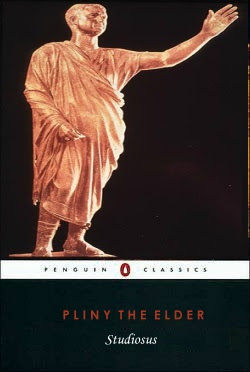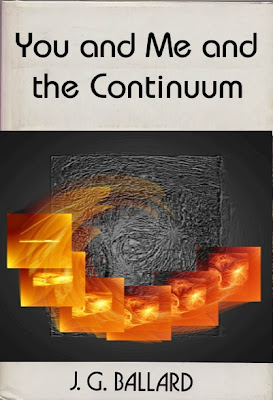Thus, the novels and the plays featured here are books which existed at one time, but you certainly can no longer pick them up at your local bookstore. Whenever a lost novel is found there is a great rush to get it published as sales, if only based on curiosity alone, are typically strong. This is a range of some of the interesting lost books. I have worked on the covers over a few weeks and have noticed I have become rather dependent on Victorian paintings for the covers, sort of Pre-Raphelite style in most cases so I hope you forgive my lack of imagination in this respect. I will do them in chronological order.
Pliny the Elder (23-79) was a Roman historian, natural historian and author. We have more of his natural history works than we do his other material. His 'History of the Times' and 'History of the German Wars' may have given us a different picture of Roman civilisation especially penetration into Germany as many now believe that there were Roman settlements farther into Germany than was previously thought. In addition Pliny lived through the end of the Roman Republic into the Imperial period, including the conquest of Britain. The book featured here, 'Studiosus' was his lost study of the art of rhetoric, an important skill in Roman civilisation.
'Love's Labour's Won' by William Shakespeare (1598)
As discussed in a previous posting it has been argued that a number of other writers may have been responsible for William Shakespeare's (1564-1616) work. In addition there are plays that are attributed to William Shakespeare and may or may not have been written by him and quite often were collaborations between him and another writer. Aside from these discussions there is harder evidence that shows a number of his own plays have been lost. 'Love's Labour's Won' written in 1598 was the matching play to 'Love's Labour's Lost' but there is no trace of it today. (In an episode of the British television series 'Doctor Who' the time-travelling characters meet Shakespeare and having saved him for attack by alien witches this missing play is mentioned).'Les Journées de Florbelle' by the Marquis De Sade (1807)
The Marquis De Sade (1740-1814) was a playwright and author in the years leading up to and including the French Revolution and almost to the end of the reign of Napoleon. He is renowned for his erotic fiction and his name was given to the sexual perversion of 'sadism' in which a person gains sexual gratification from inflicting pain, though the term has now broadened to refer to straight forward brutality. De Sade spent much of his life in prison or insane asylums. He his most famous for 'Justine', 'Juliette' and '120 Days of Sodom'. The Marquis's son had all of his unpublished manuscripts burnt after his father's death including the many volumes of 'Les Journées de Florbelle' featured here. Another eight of De Sade's works have been lost.
'The Poor Man and the Lady' by Thomas Hardy (1867)
Thomas Hardy (1840-1928) is an author renowned for his sentimental dramatic stories set in the West of England, possibly his most famous book is 'Tess of the D'Urbevilles' (1891). 'The Poor Man and the Lady' was Hardy's first novel written in 1867, but not finding a publisher for it he destroyed the manuscript. His first published novel was 'Desperate Remedies' (1871) though it was published anonymously. If he had kept hold of 'The Poor Man and the Lady' manuscript it is likely he would have found a publisher for it in the early 1870s. With this cover as with Aeschylus and Pliny the Elder, I have used the wide-ranging Penguin Classics range which covers both works of the Classical World of Ancient Greece and Rome as well as 'classics' from books through the centuries.'Pilgrim on the Hill' by Philip K. Dick (1956)
Philip K. Dick (1928-1982) has featured quite a bit on this blog so probably needs no introduction. Somewhere in the world probably exists an actual copy of this book with a different cover as there are three of Dick's earliest novels: 'A Time for George Stavros' (1956), 'Nicholas and the Higs' (1958) and this one which have subsequently become lost. Dick features religious elements in some of his novels. In 'Do Androids Dream of Electric Sheep?' (1968) via a device he and his wife grasp, the hero tunes into a constant television programme of religious leader struggling up a hill who can throw rocks at the viewer. So though I have no idea about the content of the 1956 novel 'Pilgrim on the Hill' one might speculate its plot included some elements of this.
'You and Me and the Continuum' by J.G. Ballard (1957)
This is another lost early novel of a science fiction writer, though J.G. Ballard (born 1930) never actually finished it, it was seen almost completed in 1956. Ballard has given rise to the term 'Ballardian' because of his various dystopian visions such as 'The Drowned World' (1962), 'The Burning World' (1964) and even Shepperton (in Surrey, England where he lives) becoming an overgrown jungle in 'The Unlimited Dream Company' (1979). Attention to him in the mainstream media has been around his novel 'Crash' (1973) and the movie that was made of it in 1996 about people who get sexually aroused by car accidents and his semi-autobiographical novel about his life in China during the Second World War in 'Empire of the Sun' (1984) and its movie of the same name in 1987. Maybe 'You and Me and the Continuum' would have been a more mainstream science fiction novel, maybe it would have been an early engagement with his later dystopian themes of worlds out of control. Ballard is still alive so maybe someone will ask him if he remembers and if they do (or already have done) can someone point me towards his answer.
'Double Exposure' by Sylvia Plath (1964)
Maybe our computer age is ending the 'lost' novel, now that we are no longer dependent on handtyped manuscripts that can be lost by authors (even when this appeared as a conceit in the movie 'Love Actually' (2003) it appeared very dated) or destroyed by their executors. Different versions of novels can be deleted by a touch of a button. However, so many of us create backup files (often our computer will do it without asking, this blog keeps saving as I type so even if I died while writing this my partially saved 'lost' blog posting would remain for discovery) that there may be many copies that would not be deleted. In addition, I have already encountered this, that there are stories I have saved on disk that I cannot now access because the file type has changed and I cannot open them to delete them maybe one day a data archaeologist could get in and access my early work (this happened to the University of Hull's computerisation of the Domesday book carried out in 1986, they thought they were all high-tech at the time, but a decade later no-one could access their files; funnily enough, the original Domesday Book is as easy for a user to read as the day it was written).
So, anyway, this speculation brings me to why my cut-off date for a lost book maybe the 1960s, twenty years before home computers. The manuscript of 'Double Exposure' or 'Double Take' (people are uncertain about the exact title, I picked the former, partly because of the mental illness Sylvia Plath (1932-1963) suffered and a sense of a divided personality and by including the Marilyn Monroe image in the picture it suggests double taking a celebrity) was seen in poet Sylvia Plath's possession around the time of her suicide and it is believed the manuscript was destroyed in 1970. I imagine it being taken up and published posthumously. Monroe had died in 1962.
So all of these books see counter-factuals if just simply in someone holding on to what had been written. At the minimum their survival would have expanded the body of work we discuss about these writers and their books may have fed into our contemporary culture triggering a range of cultural outputs. Of course, given that lost work seems to keep turning up in recent years, it is quite possible we will see some of these on the book shelves in the coming future.








No comments:
Post a Comment